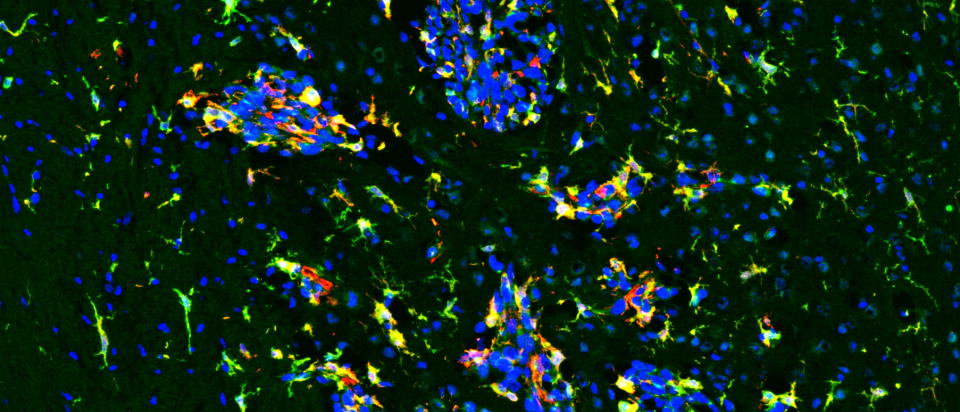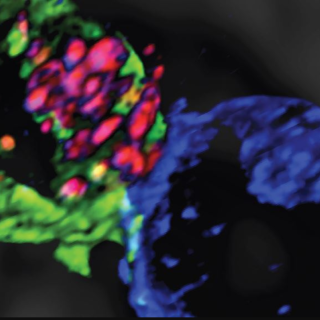News and Events
New Strategy Shows Promise Against Deadly Breast Cancer in the Brain
A new NIH study points to a promising strategy for treating aggressive breast cancer that spreads to the brain, a complication with few effective options. Learn how blocking a key brain cell survival pathway could open the door to future therapies.
Read MoreClinical trial researching T-cell therapy for epithelial cancers
Scott M. Norberg, D.O., Assistant Research Physician in the Center for Immuno-Oncology, is leading a trial researching T-cell therapy for gastric, breast, cervical, lung and other types of epithelial cancers.
Read MoreTargeting sugar-molecule tags to proteins in the treatment of aggressive lymphomas
CCR researchers, led by Louis M. Staudt, M.D., Ph.D., have discovered a novel approach to treating diffuse large B-cell lymphoma with potentially fewer treatment-related side effects. Their work identifies and exploits the role of sugar-molecule modifications in B-cell survival.
Read MoreClinical trial researches therapy for pancreatic acinar cell carcinoma (PACC)
A clinical trial led by Christine Campo Alewine, M.D. Ph.D., Lasker Clinical Research Scholar in the Laboratory of Molecular Biology, is researching a therapy for pancreatic acinar cell carcinoma (PACC), a rare type of pancreatic tumor.
Read MoreClinical trial researching therapy for aggressive blood cancers
A clinical trial led by Christopher J. Melani, M.D., Assistant Research Physician in the Lymphoid Malignancies Branch, is researching a combination drug therapy for aggressive blood cancers, such as non-Hodgkin lymphomas.
Read MoreClinical trial researches therapy for metastatic melanoma or renal cell carcinoma
A clinical trial led by Stephanie L. Goff, M.D., Associate Research Physician in the Surgery Branch, is researching a therapy for people with metastatic melanoma or renal cell carcinoma.
Read MoreClinical trial researches drug therapy for chronic graft-versus-host disease
A clinical trial led by Noa G. Holtzman, M.D., Assistant Research Physician in the Immune Deficiency Cellular Therapy Program, is researching a drug therapy for chronic graft-versus-host disease.
Read MoreClinical trial researches drug therapy for CNS tumors
A clinical trial led by Jing Wu, M.D., Ph.D., Lasker Clinical Research Scholar in the Neuro-Oncology Branch, is researching a drug therapy for aggressive diffuse gliomas.
Read More2023 Frontiers in Basic Immunology
Dates: September 27-28, 2023
Location: Building 35, Room 610/620/630/640
The Center for Cancer Research at the National Cancer Institute is hosting a two-day national symposium on September 27-28, 2023 entitled 2023 Frontiers in Basic Immunology. The program includes recent advances in the field and should be an exciting forum for discussion and debate on the current understanding of basic immunological mechanisms. Check the website for a list of speakers.
Read MoreWith new database, NCATS data is poised to support development of precision cancer therapies
Data from thousands of compounds and nearly 200 cancer cell lines screened at the National Center for Advancing Translational Sciences are available through a new CellMiner database.
Read MoreAndre Nussenzweig elected to the National Academy of Sciences
Andre Nussenzweig, Ph.D., Chief of the Laboratory of Genome Integrity, has been elected to the National Academy of Sciences in recognition of his distinguished and continuing achievements in original research. He investigates the mechanisms that maintain genomic stability and prevent cancer, particularly in DNA repair pathways.
Read More









